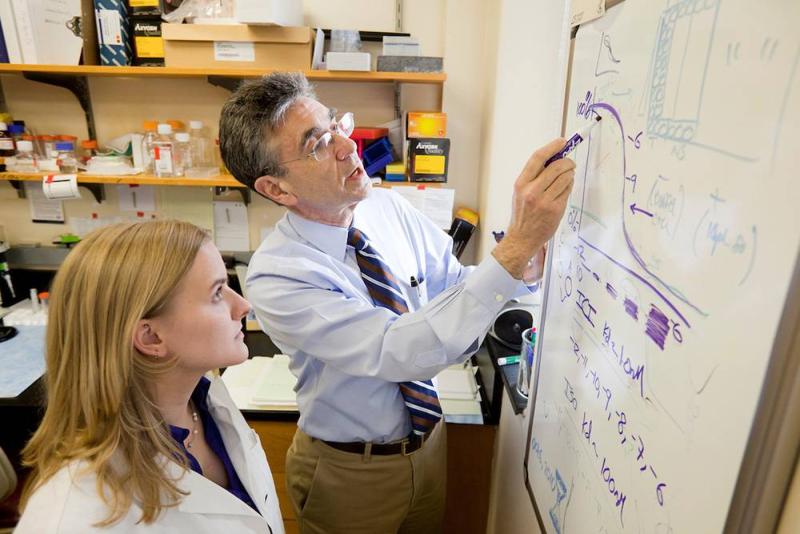
Five years after sharing the 2012 Nobel Prize in Chemistry with his former student, Stanford’s Brian Kobilka, Robert Lefkowitz of the Duke University Medical Center continues lab work. At age 75, he’s still building on the groundbreaking discoveries that reveal the functions of G protein-coupled receptors which drive the effects of half of all medications. He also contemplates issues as timeless and conventional as the importance of mentors and as topical and controversial as the danger of the anti-science attitudes of the current presidential administration. At the fifth anniversary of his becoming a Nobel laureate,, Lefkowitz sat with Emilia Chiscop-Head, an internationally awarded journalist now working at Duke University Initiative for Science & Society, for a wide-ranging discussion.
ECH: In your autobiography, you call yourself a “serendipitous scientist.” Could you explain what you meant by this title and the magic role of serendipity in your life?
Robert Lefkowitz: I was thinking of two aspects of my career. One, that the whole fact that I had a career In science was pure serendipity because that was not the direction that I was going; and the second meaning I had was just that I think, frankly, that most successful scientific careers -- and certainly most Nobel prize winning careers -- are filled with serendipity. The serendipity of my career had to do with the fact that I was planning to be a physician, and it was only because of the Vietnam War and the fact that there was a draft of physicians that I was looking for a way out of serving in a very, very unpopular war. And I was able to do that by joining the United States Public Health Service as a commissioned officer, which counted for my draft service, and then being assigned to the National Institutes of Health to learn how to do research. And after a very -- shall we say -- checkered start there filled with failure, I eventually met with some success. That's a whole long story. But, as I say, ultimately it was because of that experience that I wound up gravitating to science. So that was pure serendipity, circumstances way beyond my control. I never would have dreamed up such a career. And then, of course, on a day-to-day basis in science, every once in a long while serendipity just sort of drops in and gives you a remarkable gift because you've got a chance. Chance favors the prepared mind. It's true. You've got to be ready for it.
But of course beyond serendipity there is a huge amount of work. I was just curious. If you were to quantify the number of hours invested in your research on protein receptors what would that look like?
What would the numbers be? Well, you know what? It really is such a huge number, because I have been pursuing this line of research for just under 50 years -- 49, but who's counting? I've never viewed it as work, OK? So when I'm in it and you say, "Well how many hours a week have I worked?" even that's almost unanswerable because I couldn't tell you when I'm working or playing. Certainly, you know 10-hour days in the lab and office, etcetera. Maybe somewhat less now at age almost 75. But then at home in the evenings and on weekends, much of the time I'm working. I'm not really working. I'm just doing what I do. And it will be work and reading papers planning experiments e-mailing with my students and fellows at all hours. So it all runs together. I don't have a clean separation between work and recreation.